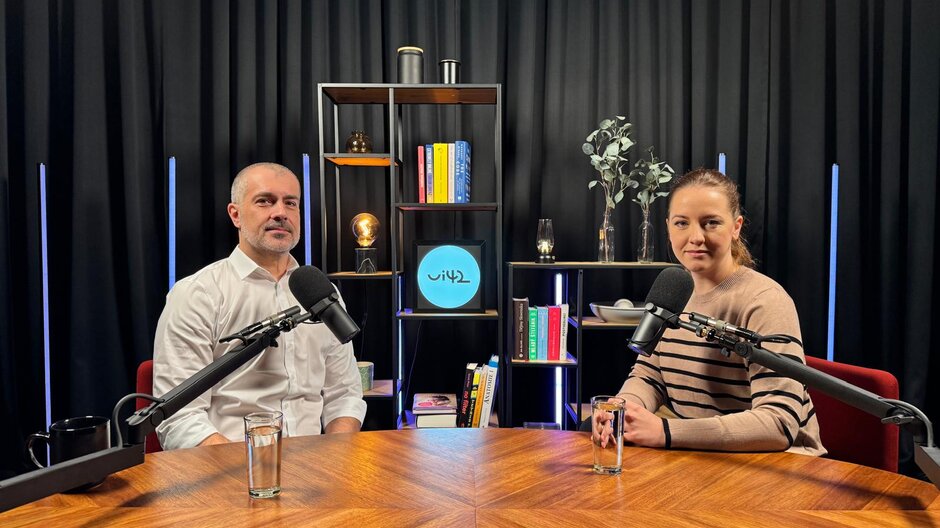Jozef Szabo from ToiToi & Dixi: It's important to tidy up your ego and roll up your sleeves
How does a manager become a crisis manager who can get a company back on its feet? Listen to a sincere and inspiring interview with Jozef Szabo, the CEO of ToiToi & Dixi Slovakia.

Jozef Szabo, CEO of Toi Toi and Dixi Slovakia, was the first guest on the BiznisLab podcast, where he revealed the challenges he had to overcome when joining the company, what he considers most important in leading people, where he "got burned," and how he sees the future direction of the company.
Strategic Decisions and Management Change
When Jozef Szabo took over the company's leadership, his main goal was to bring the company from negative numbers to profit. This process was not easy and required not only reorganization but also bold decisions. “These were necessary, but the most important step was to enforce change at the managerial level," says Szabo, who experienced firsthand that not all decisions can be made slowly. "Today, I would do some things much faster," he adds.
How to Be a Leader in a Small but Dynamic Market?
The Slovak market for mobile toilets may not be large, but it is all the more dynamic. According to Jozef Szabo, 10 to 15 players share the customers, with Toi Toi & Dixi being among the top three companies with a market share of around 50%. Compared to global figures, this is still negligible, but our goal is to maintain our position as a market leader," he adds. While Slovakia has a relatively small market, the company is striving to expand into new markets in the USA and Asia, which brings new challenges and opportunities.
In Slovakia, Toi Toi and Dixi provide services in two main segments – short-term rentals for events and festivals and long-term collaborations with construction companies.
Even though many competitors push prices down at the expense of quality, Toi Toi & Dixi takes the opposite approach. “Reputation is key for us. We recently turned down a festival that was unwilling to meet our hygiene requirements. We would rather lose a contract than risk the reputation we have built over the years,” explains Szabo.
Education as a Key to Changing Decision-Making in B2B
One of the biggest challenges facing Toi Toi & Dixi is the difference between clients and users of their products. “Managers and directors do not use the cabins, so they often do not care about quality. Those who use them – employees or workers – have no say in the decision-making process,” explains Jozef Szabo. This fact creates a barrier to promoting quality solutions and underscores the importance of educating partners.
An example where Slovakia lags behind is hygiene standards. While in Germany, 96% of mobile toilets have a sink, in Slovakia, it is only 13%. This difference clearly shows that companies still prioritize cost over quality.
The company is therefore looking for ways to open discussions on the importance of hygiene and ecological solutions. A key tool for them has become LinkedIn. “The content we share allows us to communicate broader topics and change managers' perceptions. It serves as an icebreaker in business negotiations and helps us build long-term relationships with partners,” concludes Szabo.
The educational approach that the company promotes is gradually changing decision-making in the B2B segment and shows that investing in quality makes sense – for employees, managers, and the environment.
Ecological Innovations and Sustainability
One of the biggest shifts in the company is the focus on ecological and sustainable solutions. "Customers say they want eco-friendly products, but they are often willing to choose a cheaper option," says Szabo. Nevertheless, the company is constantly working on reducing the environmental impact of its products. "For example, we are one of the largest buyers of used fishing nets, which we recycle to produce antibacterial cabins," states Szabo. These cabins contain more than 80% recycled materials, which is a significant step forward.
In addition, the company is developing its own chemicals for wastewater treatment that are more environmentally friendly. Another goal is for 50% of their vehicles to switch to alternative fuels. "Even though these changes mean higher costs, we believe the long-term effect will be worth it," adds Szabo.
Leadership in Practice
Jozef Szabo, as a leader, has learned over the past ten years that success lies in the ability to adapt communication to different levels of the team. "At a higher level, it is important to explain why quality is key, while in production, it is enough to just say what needs to be done," says Szabo. The key to team stability is also his personal involvement in the work: "Rolling up your sleeves and going among the people is invaluable. In the field, you turn off the administration and truly get to know your team's problems." This approach not only reduces turnover but also strengthens team relationships, especially in regions like central and eastern Slovakia.
Jozef Szabo has long shown that a combination of quick decision-making, emphasis on quality, ecological solutions, and open communication with employees and partners is key to sustainable growth. The story of Toi Toi and Dixi Slovakia is an example of how even in a challenging market environment, a path to long-term success can be found.
Book Tip: “One of the books that has strongly influenced me is The Art of War. It helped me perceive strategies and decision-making in business through parallels with military tactics. This is one of the most important lessons I have received in life.”

